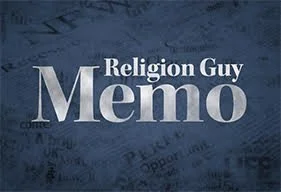The New York Times “Sunday Opinion” section, a consistent source of valuable news analysis by journalistic pros in its former incarnations, has oddly transmogrified by indulging in off-the-news features, self-absorbed memoirs and random social psychology musings, often running at considerable length.
By contrast, the “Review” section of the weekend edition at The Wall Street Journal’s has maintained its customary serious mix of news analyses, book reviews and snappy little running features.
In particular, the in-depth articles that lead off each Journal section have emerged as must reading. In particular, religion writers and the news consumers that follow the beat should note that the first two pages in the June 24-25 edition offered an important survey under the capitalistic headline “The Competition for Believers in Africa’s Religion Market (yes, this is behind a paywall).”
Much of the Journal scenario in this essay — written, in part, by Vatican correspondent Francis X. Rocca (who frequently covers other religion news and trends — will be familiar to those who closely follow international religion news, but The Guy will spotlight one notable news angle here regarding Islam.
We’re told that the African continent, apart from its Muslim northern tier and south of the Sahara Desert, is “one of the world’s most active and contested religious markets.”
The Guy would amend that to say it’s clearly the single most contested market, one where shrinking indigenous faiths have given way to strong and all-too-often violent religio-political competition between Christians and Muslims.
The experts at the World Religion Database say the region had 7.4 million Christians in 1900 and is projected to have 1.3 billion by 2050, by then making up 38% of the world’s Christians. The team at the Pew Research Center figures that by 2037 the region’s Muslims will outnumber those in their religion’s historic heartland of North Africa and the Mideast.
The Christian growth is especially strong with Protestant and independent churches (minus missionary ties) that are part of the Pentecostal and similar “Charismatic” Christian movements. These groups practice evangelistic preaching out in the streets, ecstatic and informal worship including glossolalia and dancing, personal testimonies and prophetic utterances, healings and other miracles, long and fervent prayer meetings, liberation from demons and heavy instruction in the Scriptures. Sermons defying poverty, unembarrassed pleas for money and “Prosperity Gospel” teaching are often part of this phenomenon.
Now, here’s the news. These movements that have expanded on their own and infiltrated older Protestant denominations and Catholicism since the 1950s are now inspiring the birth of similar Muslim innovations. New groups combine the faith’s age-old doctrines and liturgies with the Charismatic Christian practices as listed in the previous paragraph.
The bottom line: A sociologist at the Council on Foreign Relations even talks of “Charismatic Islam.”
One major and hugely successful example is Nigeria’s Nasrul-Lahi-el-Fatih Society, self-defined in this .pdf document. Its energetic mosque worship includes Protestant-style personal prayer requests and engaging sermons.
Any sizable shift toward the forms of worship and fellowship that have so inspired Christian growth in Africa could conceivably begin to remake global Islam.
Related journalistic comment: Major newspaper articles like this one increasingly blend the work of several reporters into a single narrative. As noted earlier, this Africa piece carries the triple byline of the sure-footed Rocca, Nicholas Bariyo from the Africa bureau and Nigeria correspondent Gbenga Akingbule. This trend imitates the multi-staff pioneering at Time and then Newsweek, although the newsmagazines always had a single writer who then compiled material from varied field correspondents.
Changing topics: There’s solid story potential in the new book “God the Bestseller: How One Editor Transformed American Religion a Book at a Time” (HarperOne) by Stephen Prothero (which The Guy has yet to read). A Christian Century review says Eugene Exman was “a spectacularly influential but little-known editor” who produced religious best-sellers at Harper & Row from 1928 till 1965. His work nudged millions to embrace “spirituality” and downplay “religion and “helped to empty the pews in 21st Century America.”
Those were mainly “Mainline” Protestant pews. The “progressive Christian” reviewer notes that the book largely ignores the success and influence of conservative evangelical publishers beginning after World War II.
FIRST IMAGE: Map featured on SMIC Comparative Government website feature about divisions inside modern Nigeria.


